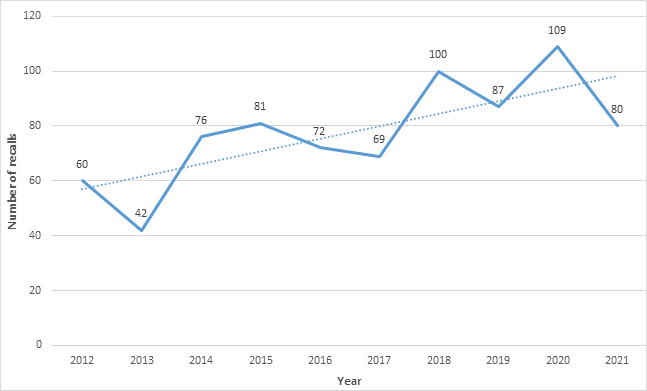What would your plan be if one of your products needed to be recalled?
Everyone in the Food and Beverage industry acknowledges that a recall can be catastrophic for the brand and reputation of their organisation.
The aim of any recall is to stop the sale and distribution of a product as soon as possible. For businesses in the food and beverage industries, predicting food safety incidents plays a significant strategic role in managing brand reputation, food safety and to preventing loss financially.
Every business will have different exposure points but one thing they all have in common is the real risk of a recall. Recovery from a food product recall is a damaging and highly expensive process, which is why the focus should lie not just on a crisis recovery plan but on proactive prevention.
With Food Standards Australia and New Zealand (FSANZ) having reported 763 recalls between 2011-2021, with the yearly average increasing to 76 per year.
Worryingly, the number of businesses who hold product recall insurance has also dropped from 81%, down to 56% (2021 Victual AIFST Product Recall Survey), meaning a large number of businesses have little to no protection, other than their balance sheet, should something go wrong.
For those who do have insurance, a significant number – 43.9% were not sure what type of product recall insurance they were covered for.
So do you know how you’d react in the event of a product recall? At best inconvenient and attracting unwanted attention from regulators; at worst – your ongoing viability.
Whilst the risk of recall cannot be entirely mitigated, due to operational, manufacturing and supply chain variables, there are ways you can help protect your business.
The good news is, whilst there’s no way to eliminate the risk, there are ways you can help protect your business!
- Know your business! HACCP would have identified the critical areas to focus on but do you really know how well you are controlling and managing them?
- Mock Recalls not traceability exercises: Make the mistakes in a pretend scenario, not when the heat is on. Knowing how to get your product out of the market quickly and as painlessly as possible.
- Communications: understand who your stakeholders are and prepare media releases in advance.
- Regulators: Contrary to instinct talk to the regulators – the earlier the better.
- Viability: Understand whether your business can sustain a significant financially impact and if not, look to transfer the risk to insurers.
If you’d like to assess your risk of product recalls or understand how to protect your business, please don’t hesitate to talk to one of our team.



